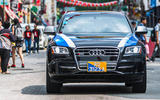British automotive technology supplier Delphi Automotive is to begin public tests of a fleet of automated taxis in Singapore next year.
The firm, based in Kent, is preparing a fleet of Audi vehicles with automated driving and mapping systems to operate around a four-mile route of the one-north business park in the Queenstown area of the city.
The three-year pilot is in collaboration with the Singapore Land Transit Authority (SLTA), which aims to launch an operational automated taxi service, using electric vehicles, by 2022.
The test is part of the Singapore Autonomous Vehicle Initiative (SAVI), which was formed in 2014 to provide a test bed for automated driving providers and stakeholders. Delphi is a partner in the initiative.
The SLTA hopes this test will help develop technology to assist commuters on the first and last mile of their journeys, covering the distance between home or work and mass transit stations.
As well as trialling the vehicle navigation and driving systems, Delphi plans to use the test to develop cloud-based mobility-on-demand software, which can be used by the public to call a vehicle to their location using their mobile phones.
“When we think about cloud-based services today, they are very well developed for mobile phones,” said Glen De Vos, vice president of Delphi Services. “You have tremendous options for your mobile phone, whether it’s making reservations or shopping, news feeds or sports scores. The car doesn’t really have any of that. We’re talking about bringing that into the car as you make your plans. That can be getting from point A to point B for dinner, for meeting friends, making a trip, and the intent is to integrate those.”
Delphi is not the only firm looking hard at automated driving systems which could replace traditional taxis or ride-hailing services. Uber has poured $500 million into a mapping project and has been testing a self-driving Ford Fusion in the US, while its competitor Lyft is working on a similar project with General Motors.
Phill Tromans










Join the debate
Add your comment
Not really British, it's American
After all, it's what's left of the mighty GM Automotive Components Group, now leaner and with a much more global footprint.
Ps. FCA is also not British, they remain italoamerican no matter where their fiscal HQ are (in the City of London in this case)